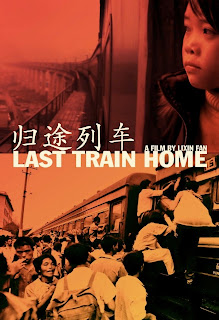It's hard to believe this is a
Shiota Akihiko film; it's so mainstream sentimental. Compared to the two very independent flavored films about lost teenagers he made just before and after this one—the brutal
Harmful Insect and the ennui filled
Canary, not to mention his twisted psycho-sexual drama debut
Moonlight Whispers—
Resurrection is mall fodder. It's not bad as far as these things go. It just surprised me. The film stars adults instead of teenagers, but in the end it is very much a teen film.
People start returning from the dead. Children to parents, husbands to wives, wives to husbands, and so on. Each of these resurrections gets its own postcard-style short story and they are all meant to pull the heartstrings, nothing more. They have almost nothing to do with one another and they don't build to any big party for the dead. The film is a loosely knit series of vignettes held together by a government bureaucrat who returns to the little town where the events are happening, which also happens to be the town where he was born, to investigate the occurrences. Of course there is a girl there whom he pined for but lost contact with when he moved away. She serves as a love interest and sceptic. There's a twist and then you're supposed to cry.
It's all good. The film is so harmless it's hard to object to anything about it, except maybe the government bureaucrat's haircut.
Tsuyoshi Kusanagi, as the bureaucrat, is an odd looking fellow. He'd been a member of the pop group
SMAP, which lends more to the mall fodder aspect of the film, and he approaches the role with a sincere earnestness. He has a few well done moments of emotional outburst but is overall pretty flat, although not disagreeable, as an actor.
Yuko Takeuchi is wonderful as the tomboyish love interest.
There is, actually, a big party for the dead at the end, but not really. It's a concert, which at first seems to serve only to highlight a couple songs, in their entirety, by pop singer
Kou Shibasaki. Then you remember, "oh yeah, that's the girl from the beginning of the movie". It's not that this film is hard to follow, it's just structured in a way which favors feeling over narrative. The vignettes don't come together
Altman style. They are all pretty much self-contained units.
This movie was a big hit in Japan when it came out, back when SMAP and Shibasaki were at the top of the charts, and was probably a lot more fun than it is now. What's interesting to me about it is seeing it in the context of
Akihiko Shiota's other work. I haven't seen his two most recent films,
Dororo and
A Heartful of Love, but if this one is any indication, it suggests he is fully capable of making mainstream commercial films if he wants to. I don't know if that is good or bad.
★★★
Director:
Akihiko Shiota
Starring:
Tsuyoshi Kusanagi,
Yuko Takeuchi, Yuriko Ishida, Sho Aikawa, Keiichi Yamamoto
IMDb
Asianmediawiki
Japan Times
Beyond Hollywood








